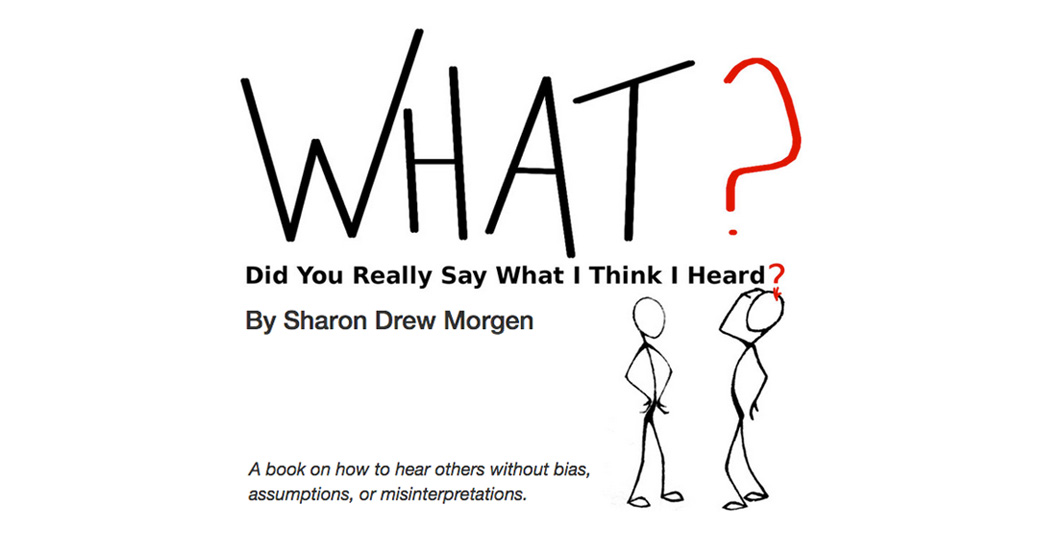What You Need to Know about Systems and How they Affect Change
 As a Change Facilitator, I often get asked about the nature of decision making, change and buy-in. Since my responses seem surprising in their laser focus on systems, I thought it might be an interesting conversation to start among influencers: what role do systems play in change? I contend that unless we understand systems we can’t hear others without bias, can’t pose pitches or try to influence others, can’t effectively design or implement projects and project teams, and can’t effectively maintain relationships.
As a Change Facilitator, I often get asked about the nature of decision making, change and buy-in. Since my responses seem surprising in their laser focus on systems, I thought it might be an interesting conversation to start among influencers: what role do systems play in change? I contend that unless we understand systems we can’t hear others without bias, can’t pose pitches or try to influence others, can’t effectively design or implement projects and project teams, and can’t effectively maintain relationships.
To that end, I’ve jotted down a few of my favorite ‘laws’ of systems that might help explain my intense respect for them, and provide you with baseline truths of how our status quo rules our behaviors, how our beliefs and decisions are tied together, and why it’s so difficult to change anyone’s mind.
Here are my thoughts on how and why systems are not only central to change, but the glue that makes the status quo so substantial and change so difficult; at the end, I offer an approach to enable congruent, inside-out, permanent change.
- A system is a conglomeration of elements that represent the status quo and have agreed to the same rules and beliefs which are then expressed through behaviors. All behaviors represent and express the beliefs and rules inherent in the system.
- A system has created its status quo, with a set identity and Hierarchy of Beliefs that govern it. It’s largely unconscious and historic, designed to maintain itself as is, perpetuated by the historic rules that recreate it daily, and defends itself at all costs. It can be said that all systems are complex in their own way.
- A system always makes choices that enable it to maintain itself with minimal disruption. Regardless of how others interpret the decisions or choices made by the system, our take-aways as Outsiders are always subjective.
- A system just IS. Systems always act upon the givens, rules, beliefs, etc. that define it, and are congruent onto itself.
- No one from outside the system can ever understand why it does what it does (i.e. behaviors) due to its idiosyncratic nature. While it may appear to Outsiders to be ineffective, unstable, etc, (all judgments seen through an Outsider’s subjective filters) a system has developed operational behaviors, created the rules and elements of the status quo that maintains itself daily, and will not allow itself to be disrupted.
- When Outsiders attempt to push their own agendas through advice, information, ideas, content (i.e. sales, coaching, healthcare, marketing, training, leadership, management) they are pushing against a closed, fixed system that must resist external influence in order to maintain Systems Congruence.
- No change can occur unless a system makes room for the new (systemic reorientation) in a way that maintains the rules of the system (Systems Congruence). The system is sacrosanct, regardless of its downsides.
- All elements within a system that would be touched by a proposed change must agree to changing its rules, and buy-in to all of the elements that will change. This is the only way to ensure Systems Congruence. Otherwise there will be rejection, sabotage, lost relationships, misunderstanding, failed implementations, delayed sales cycles, etc. In other words, attempting to create or influence change (aimed at the behavioral level) will fail unless the system has already reoriented itself to seek and adopt change because it is convinced it cannot fix a problem itself, and has a specific path forward that is congruent and avoids disruption.
- All decisions are change management problems. Decisions are prompted by changes in the Hierarchy of Beliefs, and get made only when there is internal alignment to ensure continued congruency.
- To influence change, decision making, and buy-in, influencers should focus on the origination points (in beliefs) that designed the behaviors to begin with.
- Successful change can occur only when the system has assembled, and gotten buy-in from, all of the elements in the status quo that would be modified as a result.
- Before change can happen, there must be a systemic understanding within the system of the downside of change, and it must be compensated for congruently or there will be fallout as it fights to maintain stability.
- Before change can happen, the system must know with certainty that it cannot fix a problem on its own. The last thing a system wants is to accept an external fix, or change.
- Information does not teach a system why, when, if, or how to change. Information is necessary at the end, once there is buy-in for change, and only to fill in the necessary gaps when the system gets to the point when it recognizes it cannot fix itself, has gotten the go-ahead (buy-in) from each of the affected elements and knows how to remain congruent while doing something differently.
- Before change can happen, systems must figure out how to re-organize, re-prioritize, enhance, or devalue, the elements that define so it continually maintains Systems Congruence.
- There are 13 steps included in all change decisions, regardless of whether it’s one person buying a toothbrush, or a global team deciding to implement new software. The steps may be iterative or unconscious, but they all must be addressed for congruent change to occur and for the components to design, buy-in to, and support, the change.
- All change must be initiated, and adopted, at the belief level. When content or influencing procedures are used to drive change, it’s too often aimed at changing behaviors, causing systemic resistance. Note: behaviors are merely the expression, the transaction, of a belief and are not the cause of change, but the response to it.
- Influencers can use their positions as Servant Leaders to enable people, teams (i.e. human systems) to traverse their own unconscious steps to change, so long as they avoid biased questions, biased listening, or content sharing, etc. and stick to facilitating the system through their own discovery and down their own steps to congruent change. Then it will be obvious the type of information required to enable change that’s non-disruptive.
WRAP UP
Systems are the core – the foundation, the status quo – of congruent human structures (people, teams, companies, families) and are based on every element within them agreeing to the same rules and beliefs that specify the operating rules for behaviors. (It’s obvious. Do you think IBM and Google and Uber all operate out of the same foundational rules and operational beliefs?).
This system gets up every day and replicates itself so it not only recreates the status quo, but maintains it. All systems resist, and potentially misinterpret, anything from outside that threatens it. Until or unless there is a systemic understanding that there will be no/minimal disruption – certainly no change without buy-in from the elements – change will not occur.
Each system (each family, each person) is unique and idiosyncratic, unknowable to an outsider due to its unconscious nature, history, patterns, and Hierarchy of Beliefs and rules.
For those of us in sales, coaching, healthcare, leadership, consulting, or any type of change management, we often use content/information (initiatives, information, Behavior Modification, education, pitches, marketing, advice, etc.) or our own intuition and needs for the Other as the means to invoke change, assuming that offering the right data, in the right format, will teach someone to do something differently.
Yet change doesn’t happen as a result of information, regardless of how critical it is, unless the system has already determined its willingness and ability to change congruently, with buy-in from all effected elements. Change only happens systemically, when the foundational beliefs are ready, willing, and able to change. Until or unless the system learns how to facilitate and incorporate new congruent choices, or reprioritize the existing Hierarchy, change cannot occur.
Conventional practices include posing conventional (biased) questions asked to elicit answers as per the Asker’s needs and curiosity, filtered through their biased listening, directed toward behavior change (rather than belief change) that they want to see occur and use biased content to convince/influence/rationalize the system to acquiesce. In other words, the approaches we’re now using won’t affect systemic change unless the system was already poised to do so.
Change only happens when the system has already agreed, and knows how to manage any change so there is no disruption (or there will be automatic resistance); change cannot happen when the system believes it will become unstable as a result.
A good rule of thumb: no one, and nothing from outside the system can change it so long as conventional questions and curiosity, biased content or convincer strategies, are used. Systems must change themselves from within. This is the reason why sales closes such a small percentage of prospects, why coaches have permanent success with so few clients, and why 97% of all implementations fail. I’ve written an article on why ‘push‘ doesn’t work.
And this is why change appears to be so hard. It’s not. We’re just going about it ineffectively. By merely attempting to change behaviors, we actually cause the resistance we get, only capture those who are ‘ready’ (the low hanging fruit), and miss an opportunity to facilitate and enable those who CAN change.
CHANGE FACILITATION
I’ve developed a Change Facilitation model (Buying Facilitation®) that manages congruent change through a unique skill set, including Listening for Systems and formulating Facilitative Questions (using specific words, in a specific order; directive and action inducing, not information driven or biased) that enable a system to discover its own route through to congruent change and its own brand of excellence. Different from conventional sales, coaching, etc. that run the risk of pushing change, facilitators enable the system to change itself, with no bias from the influencer, and results of greatly enhanced success.
Over the last 35 years, I’ve trained the model globally to corporations and teams in sales, healtcare, coaching, leadership, consulting, and communication (What? Did you really say what I think I heard?). It’s a generic model that can be used in any industry (clients include banking, consulting, insurance, tech, project implementations, wellness (doc/patient buy-in), real estate, research, travel, etc.) in any format (i.e. sales pitches, marketing articles, websites, questionnaires, customer service, team building, doctor/patient relationships, buy-in, etc.) and enables congruent buy-in and Change Readiness.
For those ready to add a new capability to their current influencing practices, I’ve designed several approaches, from self-guided study, to learning programs, to coaching. Let me know of interest.
____________
Sharon Drew Morgen is an original thinker and the developer of Change Facilitation. She has written 9 books, including the acclaimed NYTimes Business Bestseller Selling with Integrity, and the Amazon bestsellers Dirty Little Secrets and What? Did you really say what I think I heard? Sharon Drew is the inventor of Buying Facilitation® a change facilitation model that works with sales to facilitate Buyer Readiness to use with sales. She is a consultant, speaker, trainer, and coach. Visit her award winning blog: www.sharondrewmorgen.com. She can be reached at 512 771 1117 or sharondrew@sharondrewmorgen.
Sharon Drew Morgen October 28th, 2019
Posted In: Change Management

